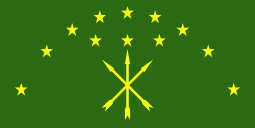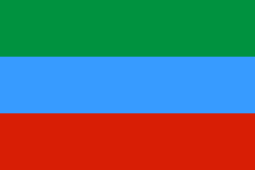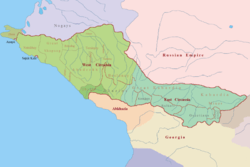Circassians in Iraq
|
The North Caucasus (in green) and Iraq (in red). | |
| Total population | |
|---|---|
| (30,000 - 50,000) | |
| Regions with significant populations | |
|
Baghdad, Sulaymaniyah Diyala, Kirkuk, Anbar, Najaf | |
| Languages | |
|
Mainly Arabic or Kurdish as well as either: Adyghe, Chechen, Lezgin, Turkmen | |
| Religion | |
| Sunni Islam | |
| Related ethnic groups | |
|
Peoples of the Caucasus Iraqi people |
Circassians in Iraq are people of North Caucasian origin in Iraq, including Adyghes, Chechens and Dagestanis.
The name "Circassian" usually denotes speakers of Northwest Caucasian languages only, however in Western Asia the name may denote North Caucasus peoples in general,[1] including Chechens and Dagestanis, who speak Northeast Caucasian languages.
History
Iraqis of North Caucasus origin mainly originate from Circassia, Chechnya and Dagestan.[1] North Caucasian tribes which settled in Iraq include: Abkhaz, Adyghes, Kabardin, Shapsugs, Ingush, Chechens, Avars, Lezgins, and Kumyks.[1]
The migration of North Caucasians to Iraq goes back many centuries,[1] peaking during the Caucasian War (1817–1864) and in the aftermath of the Russian–Circassian War with the Circassian Exile of the 1860s.[1] Adyghes came to Iraq in two waves: directly from Circassia, and later from the Balkans.[1] Chechens and Dagestanis also settled in Iraq throughout the Ottoman era.[1] Circassians also settled in large numbers in other neighbouring countries including Turkey, Syria, Jordan, and Palestine.[1]
Like all Iraqis, Circassians in Iraq faced various hardships in the modern era, as Iraq suffered wars, sanctions, oppressive regimes, and civil strife.[1]
Demographics




The overall number of Circassians or people of North Caucasus origin in Iraq is estimated to be between 30,000 and 50,000,[1][2][3] however the total number is unknown.[1] It has been reported that there are 30,000 Adyghe families in Baghdad alone.[1] It is understood that many North Caucasians have ethnically assimilated into the Iraqi population, becoming Arabicized or Kurdicized.[1] Chechens may comprise up to three-quarters of Iraqis of North Caucasian origin.[1]
Surnames such as Al-Daghestani, Al-Shishani ("Chechen"), and Al-Sharkas ("Circassian") are common among Iraqis of North Caucasian descent.
Population
North Caucasians have settled in all parts of Iraq, from Dohuk in the north to Basrah in the south.[1] The largest communities are in Baghdad, Sulaymaniyah, Diyala, Kirkuk, and Fallujah, with smaller communities in Najaf, Hillah, Mosul, Kut, Basrah, Tikrit, Arbil, Nasiriyah, Diwaniyah, Dohuk, Ramadi, Amarah, and Tuz Khormato.[1]
There are also several Circassian villages throughout Iraq, including a Chechen neighbourhood in Baghdad.[1]
Culture
North Caucasians in Iraq have integrated into Iraqi society while preserving their traditional North Caucasian culture and customs, such as the Khabze culture. They continue to preserve certain North Caucasian traditions in wedding ceremonies, birth ceremonies, and other special occasions, and to cook their traditional cuisine.[1]
In 2004, the Al-Tadamun Society of Iraqi, Chechen, Dagestani and Circassian Tribes was formed in Kirkuk. This cultural organization seeks to bring together Iraqis of North Caucasian heritage.[1] "Al-Tadamun" can be translated as "Solidarity".
North Caucasians in Iraq are predominantly Sunni Muslims like their ethnic counterparts in other countries. It is possible that a minority may also identify with Shia Islam, the majority faith in Iraq.
Language
North Caucasians in Iraq speak a number of languages, including their native languages of either Adyghe, Chechen, or Lezgin, as well as Mesopotamian Arabic, Kurdish, or Turkmen.[1] The native languages are mainly spoken by the elder generations, with younger people usually speaking only Arabic or Kurdish, the main Iraqi languages.[1]
South Caucasians
Many peoples of South Caucasus origin have also settled in Iraq, including Armenians and Azerbaijanis. Ethnic Georgians also settled in Iraq historically, and actually ruled the country through the 18th and early 19th centuries (from 1704 to 1831). The Georgians who settled in Iraq were Muslim and ultimately assimilated into the Iraqi population, as a Georgian-speaking community no longer exists in the country. Naji Shawkat, the Prime Minister of Iraq from 1932 to 1933 was of Georgian descent.
Notable people
- Mahmud Shawkat Pasha - Ottoman general and statesman.
- Yasin al-Hashimi - Prime Minister of Iraq (1924–1925 and 1935–1936).
- Hikmat Sulayman - Prime Minister of Iraq (1936–1937).
- Tahir Yahya - Prime Minister of Iraq (1963–1965 and 1967–1968).
See also
References
- 1 2 3 4 5 6 7 8 9 10 11 12 13 14 15 16 17 18 19 20 21 Ahmet Katav; Bilgay Duman (November 2012). "Iraqi Circassians (Chechens, Dagestanis, Adyghes)" (PDF). ORSAM Reports (134). Archived from the original (PDF) on 3 April 2013. Retrieved 15 April 2013.
- ↑ "Adyghe People". Joshua Project. Retrieved 15 April 2013.
- ↑ "Estimated population of Circassians". CircassianNation.org. Retrieved 15 April 2013.

